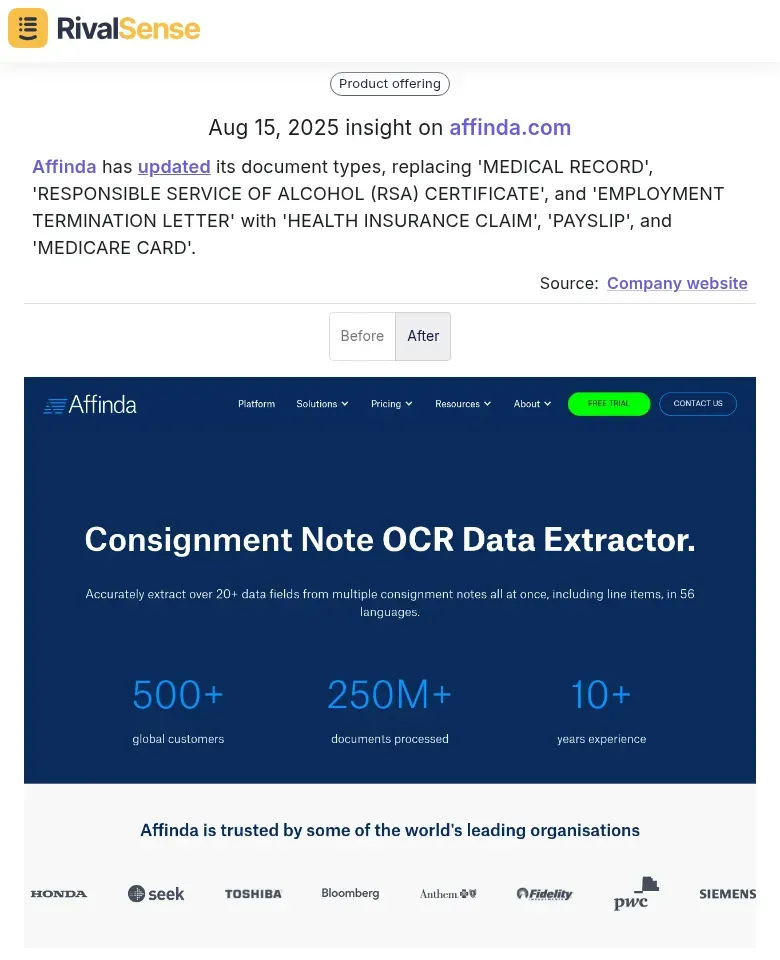How Affinda's Document Shift Empowered Competitors to Adapt
Before Affinda's strategic pivot toward document automation, the industry relied heavily on manual processing methods that were both inefficient and error-prone. Competitors faced mounting pressure as customer expectations evolved toward faster, more accurate solutions.
Initial reactions to Affinda's move ranged from skepticism to curiosity, creating market uncertainty. Practical steps emerged for businesses navigating similar disruptions:
✅ Conduct ongoing market research to spot technological trends early
✅ Invest in targeted employee training to bridge emerging skills gaps
✅ Launch pilot projects before full implementation to test viability
✅ Monitor competitor movements to identify differentiation opportunities
Affinda's Strategic Pivot: A Catalyst for Change
Affinda's shift toward AI-driven document processing fundamentally disrupted industry standards by prioritizing accuracy and scalability. This pivot forced competitors to reevaluate their offerings almost overnight as clients began expecting similar advancements.
Key aspects of Affinda's transformation included:
- AI Integration - Machine learning enhanced document classification accuracy
- Scalability Focus - Systems designed for high-volume processing without performance loss
- User Experience - Simplified interfaces reducing adoption barriers
Competitor Response Checklist:
🔍 Audit where your solution lags behind market leaders
🤖 Prioritize AI investments for automation improvements
🗣️ Gather direct client feedback to align with evolving needs
📡 Establish systems to monitor industry shifts in real-time
Competitors' Response: Adaptation and Innovation
When Affinda redefined document processing standards, agile competitors turned disruption into opportunity. Companies like DocuSense responded by enhancing their own AI categorization, while PaperTrail carved niches in underserved specialty markets.
Successful adaptation strategies included:
- Hybrid solutions combining automation with human oversight for complex cases
- Integration-first approaches ensuring compatibility with existing client ecosystems
- Gap analysis targeting weaknesses in Affinda's updated offerings
Actionable Intelligence Framework:
- Schedule weekly competitor update reviews
- Implement real-time tracking tools
- Identify and exploit competitor gaps systematically
- Balance automation with human expertise
The Role of Competitive Intelligence in Navigating Shifts
When Affinda updated its document processing focus, RivalSense provided crucial insights that helped competitors adapt strategically. Real-time monitoring transformed uncertainty into actionable intelligence.
For example, RivalSense recently tracked Affinda's document type updates where they replaced 'MEDICAL RECORD' and 'EMPLOYMENT TERMINATION LETTER' with 'HEALTH INSURANCE CLAIM' and 'PAYSLIP'. This insight reveals strategic pivots toward high-volume transaction documents, enabling competitors to either target abandoned categories or adjust their own roadmaps.

Monitoring such product shifts is invaluable because it signals market repositioning months before formal announcements, allowing for proactive strategy adjustments.
Maximize Intelligence Value:
- ⏰ Configure automated alerts for competitor activities
- 📊 Analyze trend reports to identify emerging opportunities
- 😊 Leverage sentiment data to refine customer messaging
Outcomes and Lessons Learned
Post-shift adaptation yielded impressive results: early adopters gained 15-20% market share within a year. The experience underscored that agility and intelligence-driven responses determine market leadership during disruptions.
Quantifiable Benefits:
| Metric | Improvement |
|---|---|
| Market Share | +15-20% |
| Revenue Growth | +25% |
| Adaptation Speed | 30% faster |
Proactive Strategy Checklist:
- Subscribe to competitor update channels
- Conduct quarterly SWOT analyses
- Form rapid-response intelligence teams
- Integrate competitive insights into product cycles
Conclusion: The New Competitive Paradigm
Affinda's document shift established a new industry benchmark where continuous innovation and agility became non-negotiable. This evolution proves that competitive intelligence has transitioned from passive tracking to active strategy formulation.
Thriving in this environment requires:
- 🕵️ Real-time monitoring of competitor movements
- 🏃 Organizational agility to implement rapid pivots
- 🚀 Ongoing innovation cycles to maintain differentiation
- 📚 Strategic analysis of market leader tactics
The stagnant get disrupted while the agile capture markets. By embedding these principles into your core operations, competitive challenges transform into growth opportunities.
Turn competitive shifts into your advantage → Try RivalSense Free
Get your first competitor report today and start converting market changes into strategic opportunities with weekly intelligence updates.
📚 Read more
👉 Competitive Edge: Unlocking Rival Insights from Twitter and Beyond
👉 Predictive Analysis for TV Ad Competitive Strategy Success 🚀
👉 Leveraging Competitor Insights for Smarter Financial Strategies
👉 How Euro Foods' Product Shifts Reveal Strategic Opportunities
👉 Strategic Competitive Benchmarking: The Ultimate Guide for Business Leaders
